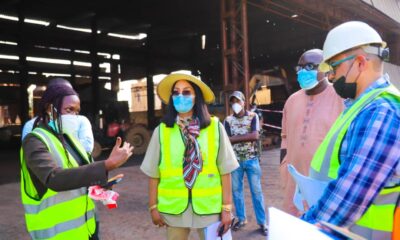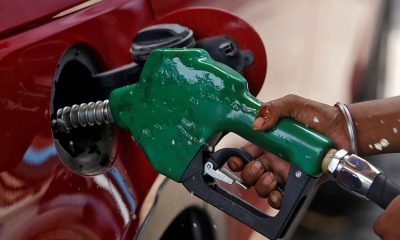Business
Dangote Refinery: MRS, other filling stations increase petrol price
Dangote Refinery: MRS, other filling stations increase petrol price
The price of petrol has surged to N930 per litre in Lagos and N960 in northern states, following the recent suspension of naira payments for crude oil by the Dangote refinery.
MRS filling stations implemented the new pricing structure on March 28, 2025, marking a N70 increase from the previous rate of N860 in Lagos and N80 higher than the former N880 in the North.
Other fuel retailers have also adjusted their prices, with NIPCO reportedly selling at N930 per litre in Magboro, Ogun State, on Saturday.
According to MRS Oil & Gas, trucks will load products from its Lagos depot and distribute them across the country at varying costs.
The company’s latest pricing document confirms that Lagos has the lowest fuel rate, while northern states face the highest prices. However, the company did not specify whether it sourced its supply from the Dangote refinery.
Under the revised price framework, petrol now costs N930 per litre in Lagos, N940 in other South-West states, and N960 in the South-South and South-East regions, including Edo, Abia, Akwa Ibom, Bayelsa, Rivers, Cross River, and Enugu.
READ ALSO:
- Ex-Rivers HoS wife cries for help over husband’s safety
- Fubara reacts as Ex-HOS, Nwaeke accuses him of bombing oil pipelines, Rivers Assembly
- Natasha: Emmanuel Uduaghan threatens to sue Senator Nwaebonyi
In the North, Abuja, Kaduna, Benue, Kogi, Niger, Sokoto, Kebbi, and Nasarawa will pay N950 per litre, while Zamfara, Kano, Jos, Bauchi, Taraba, Adamawa, Borno, Katsina, Jigawa, Gombe, and Yobe will pay N960.
The Free Carrier Agreement (FCA) price, which determines how much marketers pay before reselling fuel, also differs by region. Lagos has the lowest FCA price at N905 per litre, whereas states like Borno, Taraba, Adamawa, and Yobe have FCA prices around N888 per litre.
The recent suspension of the naira-for-crude initiative by the Dangote refinery was attributed to discrepancies in crude oil allocation. Sources indicate that the Nigerian National Petroleum Company Limited (NNPCL) allocated large volumes of crude to foreign creditors to settle outstanding loans, making it difficult to sustain local transactions in naira.
As a result, independent fuel importers have taken advantage of the situation, increasing depot prices. Industry analysts warn that the rising petrol costs could drive up transportation fares and the prices of goods and services.
Experts suggest that prices may stabilize once the Dangote refinery secures a reliable crude oil supply from NNPCL and resumes selling in naira. Until then, consumers across the country will have to contend with higher fuel costs.
Dangote Refinery: MRS, other filling stations increase petrol price
(PUNCH)
Business
Dangote urges wealthy Nigerians to invest in industries, not luxury cars, private jets

Dangote urges wealthy Nigerians to invest in industries, not luxury cars, private jets
Africa’s richest man, Aliko Dangote, has called on wealthy Nigerians to redirect funds currently spent on luxury cars and private jets into industrial investments that can generate jobs and foster sustainable economic growth.
In a widely shared interview, the Dangote Group chairman warned that the country’s elite have increasingly prioritized lavish spending over productive ventures. “If you have money to buy a Rolls-Royce, you should take that money and put up an industry in your locality or anywhere there is need,” Dangote said.
He expressed concern over the number of private jets parked at local airports, arguing that the resources tied up in such assets could instead create employment opportunities.
READ ALSO:
- Mohamed Salah Slams Liverpool Boss Arne Slot, Hints at Anfield Exit Ahead of AFCON Departure
- Indonesia Flood Disaster: Death Toll Exceeds 900 as Search for Hundreds Continues
- Russia Intensifies Airstrikes on Ukraine as Zelensky, Trump Envoys Advance Peace Talks
Dangote highlighted Nigeria’s growing population, with an estimated 7.8 million births annually, stressing that both government and private sector actors must invest in infrastructure, power, and productive businesses.
Acknowledging the country’s high taxes, he maintained that businesses must still meet their obligations. “For a company like ours, the tax we pay is too much, but we don’t mind… What we are asking for is an enabling environment, but we too must do our civic duties,” he said.
He also urged Nigerians to prioritize domestic investment over foreign capital, noting that attracting investment depends on good policy and rule of law. “We should stop calling for foreign investors because there’s no foreign investor anywhere. What attracts investment is good policy and rule of law,” Dangote added.
Dangote urges wealthy Nigerians to invest in industries, not luxury cars, private jets
Business
Imo Economic Summit: Aliko Dangote Vows to Become State’s Largest Investor

Imo Economic Summit: Aliko Dangote Vows to Become State’s Largest Investor
OWERRI — Africa’s richest man, Aliko Dangote, has assured Imo State Governor Hope Uzodimma that the Dangote Group is prepared to become one of the biggest investors in Imo State, reaffirming the conglomerate’s commitment to expanding its footprint in Nigeria.
Speaking on Thursday during the opening session of the Imo Economic Summit 2025, Dangote called on the state government to specify key sectors requiring investment, promising immediate action once directives are given.
Dangote, who described Governor Uzodimma as a long-time friend, commended him for fostering an enabling environment for business and economic growth in the state.
READ ALSO:
- NSCDC rejects VIP protection requests from senators as demand surges after police withdrawal
- Edo Assembly Moves to Arrest Obaseki, Others Over MOWAA, Radisson Hotel Probe
- Three Top Contenders to Replace William Troost-Ekong as Super Eagles Captain
“We will be one of your biggest investors in Imo. So please tell me the area to invest and we will invest,” he said.
The African industrialist also encouraged Nigerian entrepreneurs to focus on developing their home regions, stressing that sustainable economic growth cannot depend on foreign capital alone.
“What attracts foreign investors is a domestic investor. Africa has about 30 percent of the world’s minerals. We are blessed,” he noted.
Dangote further highlighted progress at the Dangote Refinery, announcing that the facility is on track to achieve a 1.4 million barrels-per-day production capacity, making it the largest single-train refinery in the world.
The assurance marks a significant boost for Imo State’s investment outlook as the government continues efforts to strengthen its economy and attract large-scale private sector participation.
Imo Economic Summit: Aliko Dangote Vows to Become State’s Largest Investor
Auto
Court of Appeal Affirms Ruling Barring VIO from Seizing Vehicles or Fining Motorists

Court of Appeal Affirms Ruling Barring VIO from Seizing Vehicles or Fining Motorists
The Court of Appeal, Abuja, on Thursday, upheld a previous Federal High Court judgment prohibiting the Vehicle Inspection Officers (VIO) and the Directorate of Road Traffic Services (DRTS) from confiscating vehicles or imposing fines on motorists without lawful authority.
A three-member panel of appellate justices, led by Justice Oyejoju Oyewumi, dismissed the appeal filed by the VIO, describing it as lacking merit and affirming the October 16, 2024 ruling of the high court.
The original suit, marked FHC/ABJ/CS/1695/2023, was filed by public interest lawyer Abubakar Marshal, who alleged that he was unlawfully stopped and had his vehicle confiscated by VIO officials at Jabi District, Abuja, on December 12, 2023. He contended that the action was a violation of his fundamental rights.
READ ALSO:
- FG secures release of three Nigerians detained in Saudi Arabia
- Groups Reject Senator’s Call for Removal of NSA Nuhu Ribadu
- US authorities arrest Nigerian CEO Cashmir Chinedu Luke for alleged $7m VA fraud
Justice Nkeonye Maha of the Federal High Court had declared that no law empowers the VIO to stop, seize, impound, or fine motorists, and granted a perpetual injunction restraining the agency and its agents from further violating citizens’ freedom of movement, presumption of innocence, and right to own property.
The court held that only a court of competent jurisdiction can impose fines or sanctions on motorists. It further ruled that the actions of the Respondents violated Section 42 of the 1999 Constitution and relevant articles of the African Charter on Human and Peoples’ Rights.
Although the applicant had sought N500 million in damages and a public apology, the court awarded him N2.5 million. Respondents included the Director of the Directorate of Road Traffic Services, the Abuja Area Commander, the team leader, and the Minister of the Federal Capital Territory.
The appellate court’s decision confirms that the VIO and DRTS cannot legally harass motorists, reinforcing citizens’ constitutional rights on the road.
Court of Appeal Affirms Ruling Barring VIO from Seizing Vehicles or Fining Motorists
-

 metro3 days ago
metro3 days agoSenate Launches Emergency Probe into Widespread Lead Poisoning in Ogijo, Lagos/Ogun
-

 News3 days ago
News3 days agoBREAKING: Tinubu Sends Fresh Ambassadorial Nominations to Senate, Names Ibas, Ita Enang, Dambazau
-

 Auto3 days ago
Auto3 days agoCourt of Appeal Affirms Ruling Barring VIO from Seizing Vehicles or Fining Motorists
-

 Sports1 day ago
Sports1 day ago2026 FIFA World Cup Draw: England Draw Croatia as Brazil Face Morocco in Tournament Opener
-

 News3 days ago
News3 days agoUS authorities arrest Nigerian CEO Cashmir Chinedu Luke for alleged $7m VA fraud
-

 metro3 days ago
metro3 days agoFG secures release of three Nigerians detained in Saudi Arabia
-

 metro3 days ago
metro3 days agoNed Nwoko vows legal action against rising online harassment, criminal defamation
-

 metro3 days ago
metro3 days agoBuratai Defends Nigeria’s Resilience, Says Nation Is “Rising, Not Failing” Despite Insecurity













